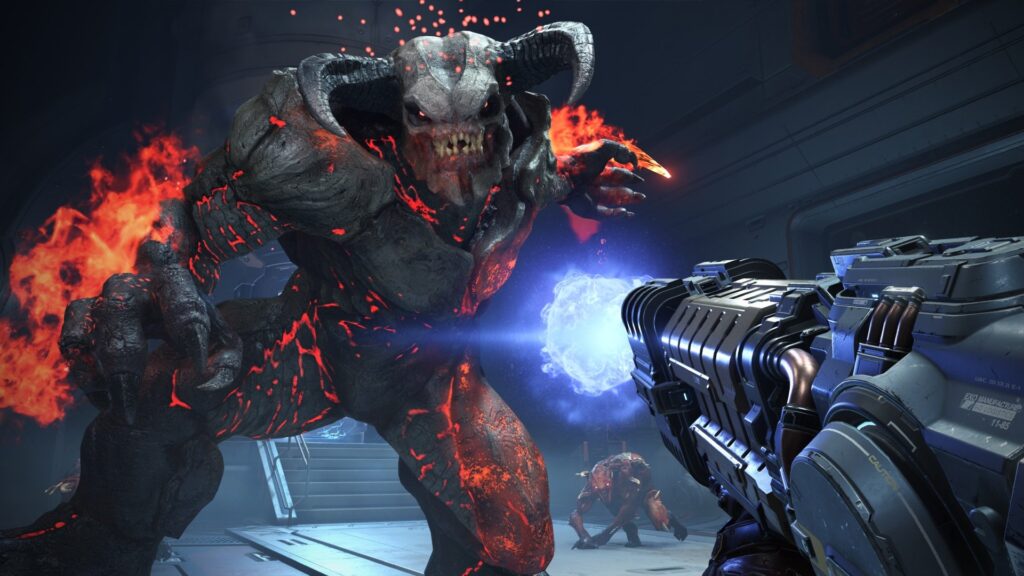
Industry conversation surrounding crunch was reignited last week when it came to light that Cyberpunk 2077 developer CD Projekt Red was utilizing the practice to meet the newly-delayed release date. Now, another developer has admitted to encouraging its employees to work long days and put in extra hours. In an interview with VG247, Marty Stratton, executive producer on Doom Eternal, conceded that the team at id Software was indeed crunching during much of 2019.
“We were crunching pretty hard most of last year. It goes in phases,” Stratton told VG247. “We’ll have one group of people crunching so the next group of people are teed up properly. As they get done, they may need to crunch a little bit. We really truly do try and be very respectful of peoples’ time and lives. We have very dedicated people that just choose to work a lot in many cases. It was nice because we want the game to be perfect. We want it to live up to our expectations and consumer expectations.”
Despite the crunch, Doom Eternal was still delayed. In October, publisher Bethesda Softworks, along with id Software, announced that it was pushing release from November 2019 to March 2020. The delay was meant to give the team more time to polish the final product, but many are arguing that no amount of polish is worth the well being of the development workforce.
“Crunch is one of the main factors in the game industry that burns out developers and causes a high rate of departures from both roles and the industry,” International Game Developer Association executive director Renee Gittins told GameDaily last week. “Caring for the mental and physical health of employees not only supports the creation of the best quality games, but ensures that the game industry grows even stronger by supporting the continued growth and well being of our developers.”
For years, the IGDA has been espousing the dangers of crunch, and the case of Doom Eternal is no different.
“Doom was the second game I ever played, and I have a great love for the series. However, I also care deeply for the game industry and my peers, and crunch is harming both,” Gittins said following Stratton’s comments.
“Game developers are not expendable resources,” she continued. “It is easy for studios and developers to be swept up in the hectic deadlines, last minute adjustments, and general passion for the games they are working on. While crunch becomes normalized in these conditions, it is not healthy–for workers, the projects, or the industry itself.”
For Gittins, it’s unrealistic to believe that anyone in the industry would fault a developer for pushing back a release if it meant that the workers shoulder less pressure to put in exhaustive hours. In addition, the practice of crunch not only lays an inordinate amount of responsibility at a worker’s feet, it also stifles the creativity and passion that fuels video games as an art form. Crunch fosters an environment of stress, panic, and sleepless nights, Gittins said, that deprives workers of the rest necessary to be productive.
“Our minds require rest and care as much as our bodies do, and pressing developers into situations where they cannot take care of their physical and mental health is irresponsible.”
Stratton’s off-handed comments about Doom Eternal’s crunch speaks to a disconnect between executive expectations and the amount of work a typical employee is capable of in a given eight-hour workday. In most cases, executives are beholden to the whims of shareholders and investors, who themselves do not appreciate the amount of work that goes into building a video game, so it falls to the press and organizations like the IGDA to shed light on this issue.
Sam, the Editor-in-Chief of GameDaily.biz, is a former freelance game reporter. He's been seen at IGN, PCGamesN, PCGamer, Unwinnable, and many more. When not writing about games, he is most likely taking care of his two dogs or pretending to know a lot about artisan coffee. Get in touch with Sam by emailing him at sdesatoff@rektglobal.com or follow him on Twitter.
 GameDaily.biz © 2025 | All Rights Reserved.
GameDaily.biz © 2025 | All Rights Reserved.